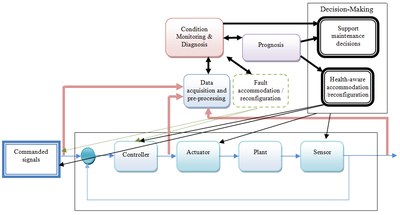SHERECS
System Health Management and Reliable Control of Complex Systems, DPI2011-26243

The safe and reliable operation of technological systems (cars, planes, trains, ...) and processes (energy, gas or water networks, chemical factories, ...) is of great interest and significance for human life and health protection, the environment, and the invested economic value. The correct operation of those systems has an important impact also on production cost and product quality in manufacturing. Maintaining the health of a complex system is a difficult task that requires the in-depth analysis of the target system, the principles involved and their applicability and implementation strategies.
The growing demand for improving the reliability and survivability of these systems and processes has led to the development of Prognosis and Health Management (PHM) and Fault-Tolerant Control (FTC) systems.
Prognostics and Health Management (PHM) is a methodology that permits the estimation of system reliability, the prediction of the remaining useful life (RUL) and the reduction of the inspection and maintenance efforts through real-time monitoring and incipient fault detection. The emergence and successful applications of PHM technology over the last decade, especially the development of on-line prognosis techniques, gave rise to a new categoryof FTC system, namely proactive FTC system. Given accurate online prognostic information, proactive FTC system manages the accumulation of further damage through control actions.

The aims of this project are:
- To develop new metholodogies and techniques for system health monitoring and management techniques, that integrating information from multiple sources, will be able to monitor and diagnose the system health as well as prognose its evolution being able to estimate the remaining useful life allow to plan maintenance actions based on the system condition.
- To develop reliable control design algorithms that will retain desired control system properties with a certain degree of reliablity after the occurence of some fault.
-
To integrate system health monitoring methodologies with realible control algorithms such that the controller will be aware about the health status of the system and activate remedial actions (as, f.e., virtual sensor or actuators) when problems in sensor or actuator health is detected.
-
To validate and assess performance of the developed techniques in UAVs and wind turbines provided by the EPO companies (CTAE and ALSTOM WIND).
SAC contribution
Conference Papers
- Escobet, T., Quevedo, J., Puig, V. (2012), A Fault/Anomaly System Prognosis using a Data-driven Approach considering Uncertainty, in the Proceedings of the 2012 IEEE World Congress on Computational Intelligence.<doi: 10.1109/IJCNN.2012.6252688>
- Teresa Escobet, Vicenç Puig, and Fatiha Nejjari (2012), Health Aware Control and Model-Based Prognosis, in the Proceedings of the IEEE Mediterranean Control Conference MED'12. Barcelona, Spain. <doi: 10.1109/MED.2012.6265718>
- Rotondo, D., Nejjari, F., Puig, V., Blesa, J. (2012), Fault Estimation and Virtual Actuator FTC Approach for LPV Systems, in the Proceedings of the 8th IFAC Symposium on Fault Detection, Supervision and Safety of Technical Processes, Mexico City, Mexico.<doi:10.3182/20120829-3-MX-2028.00142>
- Rotondo, D., Nejjari, F., Puig, V., Blesa, J. (2012), FTC Design for Polytopic LPV Systems subject to Actuator Saturations, in the Proceedings of the IEEE Mediterranean Control Conference MED'12. Barcelona, Spain. <doi: 10.1109/MED.2012.6265691>
- Rotondo, D., Nejjari, F., Puig, V., Blesa, J. (2012), Fault Tolerant Control of the Wind Turbine Benchmark using Virtual Sensors/Actuators, in the Proceedings of the 8th IFAC Symposium on Fault Detection, Supervision and Safety of Technical Processes, Mexico City, Mexico. <doi:10.3182/20120829-3-MX-2028.00185
Book Chapters
- Escobet, T., Quevedo, J., Puig, V., Nejjari, F., (2012), Combining Health Monitoring and Control. Chapter of the book title: Diagnostics and Prognostics of Engineering Systems: Methods and Techniques. Editor: Seifedine Kadry.
Share: